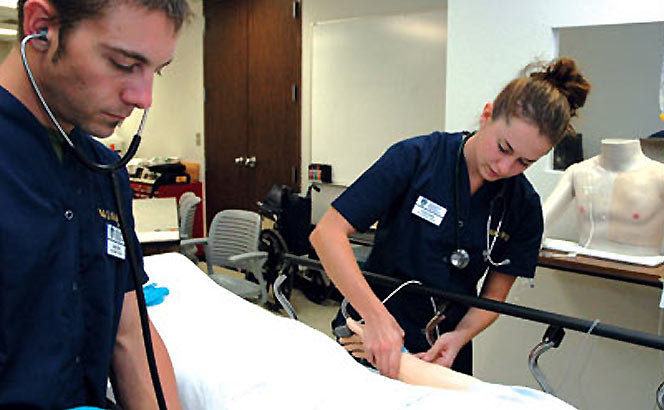A Northern Arizona University program already designed to enhance health care in Arizona will now be able to expand quicker and extend its reach farther because of a sizeable federal grant.
NAU’s new two-year master’s program in physician assistant studies has received a five-year, $997,000 grant from the Health Resources and Services Administration. The grant became effective Aug. 1.
With the grant, the NAU program plans to reinforce the foundation on which it was established: serving the citizens of Arizona.
Funding will help the program recruit students from underserved backgrounds, place them for hands-on clinical training in areas of the state that lack a strong health care presence and build strong ties to those communities. An even greater focus on recruiting military veterans also will be featured.
“Historically, especially in the graduate-level professions, there has not been an adequate number of individuals who represent the diversity of Arizona’s population,” said Richard Dehn, professor and founding chair of NAU’s physician assistant program at the Phoenix Biomedical Campus.
“What the grant is really aimed at is to increase the number of graduates of our program who end up practicing in primary care and with populations that are medically underserved,” Dehn said.
With the grant funding, Dehn said, the highly competitive physician assistant program can hone its recruiting to identify and help prepare students who have traditionally faced geographical, economic and cultural barriers.
“These are students who come from backgrounds similar to where we hope they go after they have graduated,” Dehn said.
Encouraging that move will be the clinical experience portion of the program, in which students train through hands-on work in the field.
“This grant gives us the resources to develop primary care clinical rotations in underserved areas of the state,” Dehn said. To do so, he explained, involves developing relationships with the professionals practicing in those locations, and then helping them to become effective educators.
In addition, Dehn said, community support in the form of housing and connectivity to the Internet—as well as the provision of faculty advising by the university—must be nurtured to provide adequate training and keep students connected to the program.
“There’s an array of things that turn a usually isolated community practice into a place that’s a high-quality educational experience for a student,” Dehn said.
Dehn explained that the grant reflects approaches that were already built in to the program, which now can move more quickly to reach its goals. Another foundational aspect—a commitment to educating military veterans—also is part of the grant.
“We’ve already been working to identify and encourage returning veterans,” Dehn said, “and this grant gives us the resources to identify and advise even more individuals.”
Of the 25 students admitted into this year’s inaugural program, Dehn said, two are veterans, and one of the faculty members is a military veteran.



